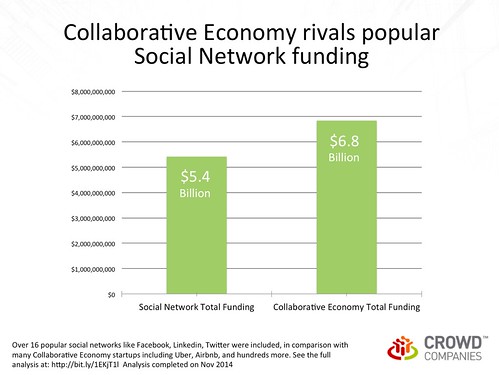
There are many ways to compare industries. I’ve conducted analysis on: adoption rates, attitudes, growth rates, and, in tech-heavy industry, funding rates. While investors have often known to be wrong, funding indicates bullish attitudes based on financial analysis and gut reaction to new markets. It’s a metric we must analyze.
If you want to see the full perspective of funding, advance to the Google Sheet of Collaborative Economy funding. Please note that there are multiple tabs.
To produce this comparison, we gathered publicly available information about consumer-facing, popular social networks, like Facebook, Twitter, and LinkedIn (and 17 others) to find out how much money a mature market, complete with winners, losers, and IPOs, has been funded. Next, we gathered public data about funding in the Collaborative Economy (Uber, Airbnb, Indiegogo, and hundreds others) to see what we could find.
A few analysis notes:
- Popular social networks are reported to have been funded by $5.4 billion over the last decade. Mostly “consumer” Collaborative Economy startups that enable the sharing of goods, services, food, money and vehicles, have been funded $6.8 billion
- If you compared, percentage wise, the Collaborative Economy has been funded 26% more than popular social networks.
- This isn’t an apples-to-oranges comparison: There are few fewer social networks (we looked at 20) than Collaborative Economy startups (we tabled 497). There is no public data for many social networks that died by the wayside lack.
- Often, funding in early stages is not reported, so it’s impossible to ever truly know what the total funding amount for many companies. Early seed and angel rounds aren’t typically reported.
- While social networks aren’t likely to be funded significantly greater, I expect that many Collaborative Economy startups are going to receive significantly more funding.
- I didn’t tally up enterprise social business software funding (community platforms, social media management systems) as there isn’t comparable software for the Collaborative Economy …yet.
Summary
This doesn’t mean that all Collaborative Economy startups will succeed. Markets often only have room for three players not like the dozens of transportation players currently available. It could also mean that Collaborative Economy companies need to be more resource-intensive to lift off the ground. It certainly means that investors, many who funded social networks, are also bullish on this next phase of P2P sharing.
no way 4 realz! so by collabarative economy vs social networks u meanin G5 Classifieds vs Facebook? i guess since its the only site similer in the hole world it kinda makes sense … but gosh darn it! i wish i knew the value yrs ago before guy capitalizd on it. i wud been on it fosho! butt congrats to dguy who made it BIGTIME! a lil disappointd but im not cryin.. just assumd fb owned everything ? but obviously wrong again.lol i feel like sucha dummy. but oh well wat can i do… …No really what can i do? any othr hidden value out there i shud kno about? we hungry. lol 4reelz! jk,,.mayb next time tho, happy holidays n great article. let me in on the scooop. 😉